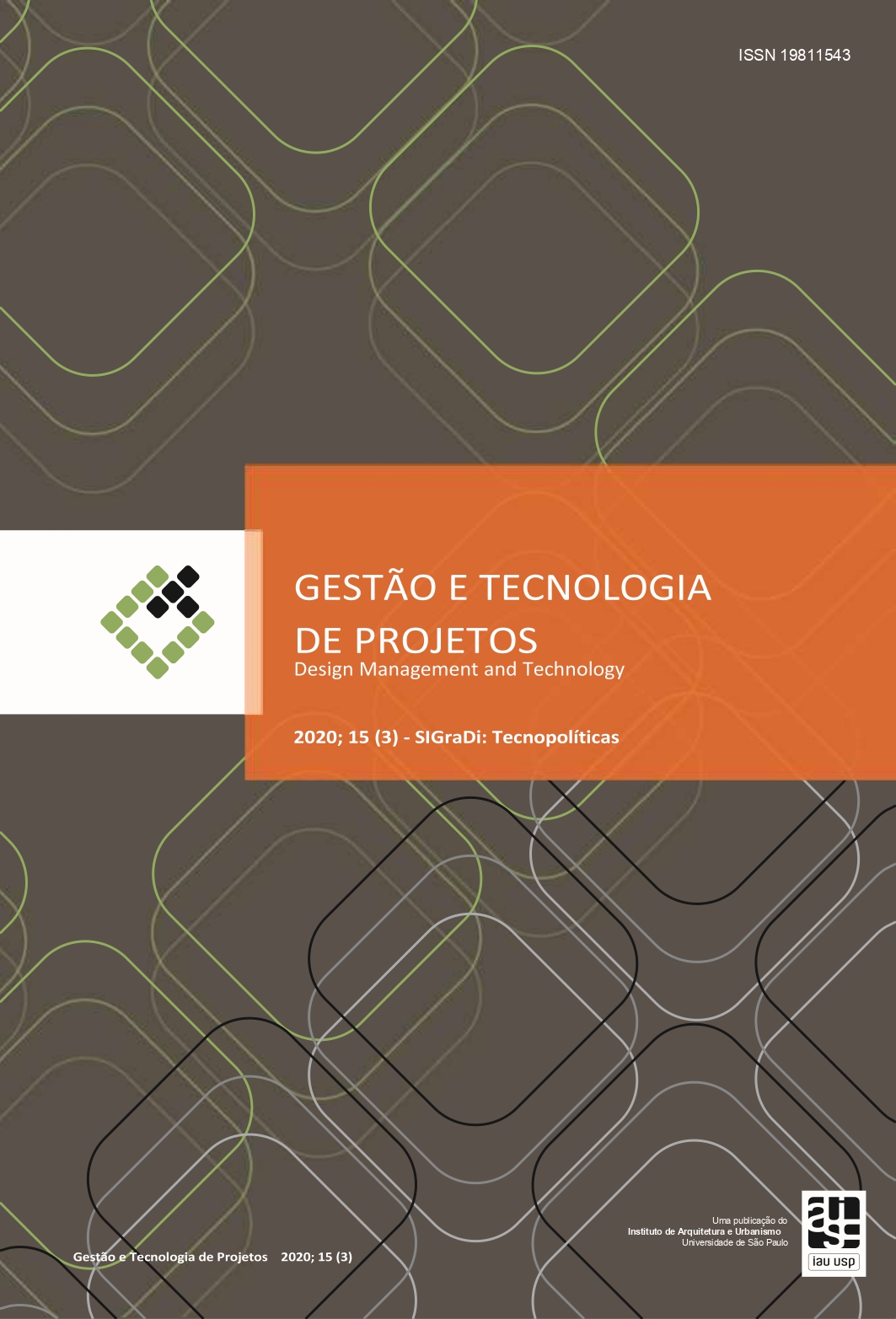Tecnopolíticas em Lisboa: redes híbridas como base para a criação de um observatório BIP/ZIP
DOI:
https://doi.org/10.11606/gtp.v15i3.166316Palavras-chave:
Cultura Digital, Comunidades de Prática, Lisboa, TecnopolíticaResumo
A condição digital levanta novas oportunidades à participação cidadã nos processos de tomada de decisão e oferece novos meios de interação que potenciam a organização e ação política coletiva. No desenho de políticas públicas para as cidades, é o momento para inclusão e criação de novas formas de distribuição de poder entre pessoas e organizações envolvidas nos processos tecnopolíticos. O presente artigo descreve o levantamento e análise de dispositivos tecnopolíticos criados via bottom-up, no âmbito do programa Bairros e Zonas de Intervenção Prioritária (BIP/ZIP) do Município Lisboa. A metodologia adotada baseia-se na definição de um conjunto de critérios de leitura das ferramentas tecnopolíticas, dos atores envolvidos, dos meios utilizados e seus propósitos políticos. O estudo permite uma reflexão crítica sobre o papel da dimensão digital na articulação e expansão da participação nos territórios, entre entidades parceiras e comunidades. Os resultados sublinham a pertinência do desenho de um observatório capaz de monitorizar o impacto do programa BIP/ZIP na cidade de Lisboa.
Downloads
Referências
ALLEGRETTI, G.; TANG, A.; SECCHI, M. Escalas Híbridas de Engajamento Social: Como a Integração de Tecnologias Pode Ampliar os Processos Participativos. In: BALBIM, Renato (org.). Geopolítica das cidades: velhos desafios, novos problemas. Brasília: Ipea, 2016.
ARNSTEIN, Sherry R. A ladder of citizen participation. AIP Journal, 1969, p. 216 a 215.
BOLLIER, David; HELFRICH, Silke. Free, fair, and alive: the insurgent power of the commons. Gabriola Island, Canada: New Society Publishers, 2019. ISBN 9781550927146
CÂMARA MUNICIPAL DE LISBOA (CML). O PLH em Acção - Programa Local de Habitação de Lisboa. Relatório da 3ª Fase: Concretizar. Lisboa, 2012. Recuperado de: https://bit.ly/2rX83SS
CASTELLS, M. Digital. La Vanguardia. Opinión, 25 Abr. 2020. Recuperado de: https://bit.ly/2MKgBqf
DE LANGE, M.; DE WAAL, M. (Ed.). The Hackable City. Digital Media and Collaborative City-Making in the Network Society. Singapore: Springer, Open, 2019.
FARIAS, A. C. C.; PAIO, A. OBZ em Lisboa: Contribuição das plataformas informacionais e interativas para potencializar os observatórios. Anais do Congresso Observatório das Metrópoles 20 Anos | As Metrópoles e o Direito à Cidade: dilemas, desafios e esperanças. Eixo 2: Gestão e Governança Urbana. Sessão 2.3 Regimes Urbanos. P. 1874-1890. Rio de Janeiro: Instituto de Pesquisa e Planejamento Urbano Regional / Observatório das Metrópoles, 2019. Disponível em <https://bit.ly/2RN9ejy>
FOTH, M.; BRYNSKOV, M., OJALA, T. (eds.). Citizen’s Right to the Digital City. Singapore: Springer Science+Business Media, 2015. DOI http://dx.doi.org/10.1007/978-981-287-919-6_11.
GUTIERREZI, Miren; MILANII, Stefania. Technopolitics in the Age of Big Data: The Rise of Proactive Data Activism in Latin America. In: CABALLERO, F. Sierra; GRAVANTE, Tommaso (Ed.). Networks, Movements & Technopolitics in Latin America: Critical Analysis and Current Challenges. Palgrave Macmillan, 2018. DOI: http://dx.doi.org/10.1007/978-3-319-65560-4_5
HAN, Byung-Chul. La emergencia viral y el mundo de mañana. In: Sopa de Wuhan. ASPO-Aislamiento Social Preventivo y Obligatorio, s.l. Mar. 2020.
KELLNER, D. Globalisation, Technopolitics and Revolution. Theoria: A Journal of Social and Political Theory, 2001, (98), 14-34.
KURBAN, H. C.; PEÑA-LÓPEZ, I.; HABERER, M. What is technopolitics? A conceptual scheme for understanding politics in the digital age. Proceedings of the 12th International Conference on Internet, Law & Politics, Building a European digital space, 499-519, 2016.
MAINKA, A.; HARTMANN, S.; MESCHEDE, C.; STOCK, W. G. Open Government: Transforming Data into Value-Added City Services. In: FOTH et al. (eds.) Citizen’s Right to the Digital City. Singapore: Springer Science+Business Media, 2015.
PATEMAN, Carole. Participatory Democracy Revisited. APSA Presidential Address. March 2012, Vol. 10, N. 1. doi: http://dx.doi.org/10.1017/S1537592711004877.
SEIXAS, João; TULUMELLO, Simone; ALLEGRETTI, Giovanni. Lisboa em transição profunda e desequilibrada. Habitação, imobiliário e política urbana no sul da Europa e na era digital. Caderno Metrópoles, São Paulo, v. 21, n. 44, pp. 221-251, jan/abr 2019.
STALDER, Felix. The Digital Condition. Cambridge, Medford: Polity Press, 2018.
STAVRIDES, Stavros. Common Space. The City as Commons. London: Zed Books, 2016.
MEDINA, J. T. (coord.). Tecnopolítica Y 15M: La potencia de las multitudes conectadas. Un estudio sobre la gestación y explosión del 15M. Barcelona: UOC Ediciones, 2015.
TOWNSEND, A. M. Smart Cities. Big data, civic hackers, and the quest for a new utopia. New York, London: W. W. Norton & Company, 2014.
TRERÉ, E.; BARRANQUERO, A. Tracing the roots of technopolitics: towards a North-South dialogue. In: Francisco Sierra; Gravante, Tommaso (ed.) Networks, Movements and Technopolitics in Latin America. Critical Analysis and Current Challenges. N.l.: Palgrave Macmillan, 2018. DOI: http://dx.doi.org/10.1007/978-3-319-65560-4.
Downloads
Publicado
Edição
Seção
Licença
Copyright (c) 2020 Ana Carolina Carvalho Farias, Alexandra Paio

Este trabalho está licenciado sob uma licença Creative Commons Attribution-NonCommercial-NoDerivatives 4.0 International License.
Autores que publicam nesta revista concordam com os seguintes termos:
- Autores mantém os direitos autorais e concedem à revista o direito de primeira publicação, com o trabalho simultaneamente licenciado sob a Licença Creative Commons Attribution-NonCommercial-NoDerivatives 4.0 que permite o compartilhamento do trabalho com reconhecimento da autoria e publicação inicial nesta revista.
- Autores têm autorização para assumir contratos adicionais separadamente, para distribuição não-exclusiva da versão do trabalho publicada nesta revista (ex.: publicar em repositório institucional ou como capítulo de livro), com reconhecimento de autoria e publicação inicial nesta revista.
- Autores têm permissão e são estimulados a publicar e distribuir seu trabalho online (ex.: em repositórios institucionais ou na sua página pessoal) a qualquer ponto antes ou durante o processo editorial, já que isso pode gerar alterações produtivas, bem como aumentar o impacto e a citação do trabalho publicado (Veja O Efeito do Acesso Livre).








